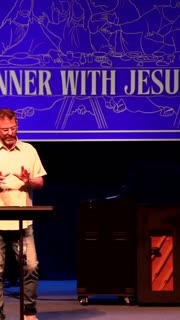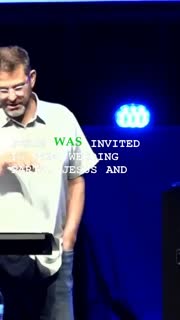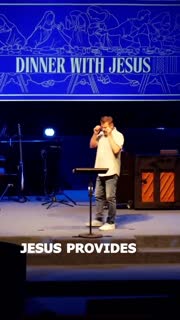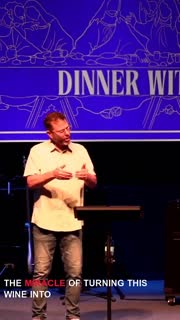Inviting Jesus: The Abundance of His Blessings
Devotional
Sermon Summary
Bible Study Guide
Sermon Clips
### Quotes for Outreach
1. "Invite him into the weddings. Invite him into the parties. Invite him into your relationships. Invite him into everything. Invite him in. Invite Jesus in. Jesus just wants the invitation. He's there waiting. He's absolutely there waiting for you. He's there waiting for the invitation. He's already invited you. We call it provenient grace. He's already invited you to his party. He just wants the reciprocal. Invite him to your party." [58:11] (30 seconds)
2. "When you seek him out, when you seek him out and you look for him, he's going to provide abundantly for you. And he will provide choiceness for you. Not just what you ask for, but more and better. When you come to God and you pray to him and you ask for provision, do you think he just gives you a little? No, he gives you abundantly. When you pray and ask God if you seek happiness, you know he doesn't give you happiness. He gives you unending joy." [56:20] (47 seconds)
3. "Jesus is waiting in your life for you to invite him to your feast. He wants you to invite him to every aspect of your life. Invite him into the weddings. Invite him into the parties. Invite him into your relationships. Invite him into everything. Invite him in. Invite Jesus in. Jesus just wants the invitation. He's there waiting. He's absolutely there waiting for you. He's there waiting for the invitation." [57:30] (32 seconds)
4. "Do you know there's only two things required for salvation? Do you know that? It's not a prayer. You don't have to go through a whole bunch of tasks to make it into heaven. That's not what you have to do. No, there's two things. You have to have faith. You have to invite Jesus in. You have to have faith in who he is. The invitation is important. And you have to accept his blessing. You have to be repentant of your sin. You have to accept his blessing. Accept his ultimate blessing." [59:14] (28 seconds)
5. "It doesn't matter where you are in your relationship with him. It doesn't matter what you've done in the past. It doesn't matter how incredibly horrible you have been. It doesn't matter the things you have done, how many times you have disappointed the loved ones around you. It doesn't matter whether you have disappointed God. He wants to have this intimate relationship with you as paralleled to the wedding. A bride and a groom. That kind of relationship. That kind of intimacy is what God wants to have with you." [55:32] (32 seconds)
### Quotes for Members
1. "Jesus was invited to the wedding party. Jesus and his disciples, they were invited to the wedding party. It says his mom was there. But Jesus was invited to the wedding party. His mom must have been some kind of important person in relationship to the wedding party. Because it says she was there. She wasn't an invitee. She was there. You know, in fact, most. If you are a guest at that wedding and they had run out of wine. That's probably a signal that, hey, the party is winding down. It's time to go home." [42:17] (38 seconds)
2. "Jesus provides better than what was originally there. I love this truth. He doesn't come up with the cheap stuff. He comes up with the good stuff. It says the master of the banquet tasted the water that had been turned to wine. He didn't know where it came from, though the servants did. He calls the bridegroom over. He says, hey, come on over here a second. Everybody else starts out with the good wine until people get to have enough. Then you can slip in the cheap stuff. But that's not what you did. You brought in the good stuff." [47:56] (46 seconds)
3. "The miracle of turning this wine into water. Is showing. Showing us that Jesus is not only able to meet our needs. He is able to abundantly exceed our desires. He has poured out abundance. He is able to take what was ordinary and make it extraordinary. The wine. Choicest of wines in abundantly. I love the description here. 6 jars. 20 to 30 gallons. Full of choice wine. That is 150 gallons of wine. Do you realize that is enough for people. For 1,200 people at a party." [52:49] (49 seconds)
4. "Jesus is the bridegroom. Make no mistake about that. He is the bridegroom. And he wants us to be his bride. and he is coming for his bride. He is coming in thunder. He is coming in power. He is coming in might. And this is going to be a marriage that is eternal. It's an eternal covenant relationship. This is the kind of relationship that God wants to have with each and every one of you." [54:37] (44 seconds)
5. "The important thing to know is it is the custom of the day to celebrate with food and wine as a symbol, as a significance of the blessing that God has given you. The wine represents God's blessing to that family. And that family alone. That's why when Jesus uses the wine in the Last Supper, his disciples would have connected to that. Saying, oh, that's a blessing. He's talking about the blessing that we are going to receive. And he's saying this wine represents the ultimate blessing. The ultimate blessing that I am bringing to you." [47:12] (42 seconds)
Ask a question about this sermon
1. "Invite him into the weddings. Invite him into the parties. Invite him into your relationships. Invite him into everything. Invite him in. Invite Jesus in. Jesus just wants the invitation. He's there waiting. He's absolutely there waiting for you. He's there waiting for the invitation. He's already invited you. We call it provenient grace. He's already invited you to his party. He just wants the reciprocal. Invite him to your party." [58:11] (30 seconds)
2. "When you seek him out, when you seek him out and you look for him, he's going to provide abundantly for you. And he will provide choiceness for you. Not just what you ask for, but more and better. When you come to God and you pray to him and you ask for provision, do you think he just gives you a little? No, he gives you abundantly. When you pray and ask God if you seek happiness, you know he doesn't give you happiness. He gives you unending joy." [56:20] (47 seconds)
3. "Jesus is waiting in your life for you to invite him to your feast. He wants you to invite him to every aspect of your life. Invite him into the weddings. Invite him into the parties. Invite him into your relationships. Invite him into everything. Invite him in. Invite Jesus in. Jesus just wants the invitation. He's there waiting. He's absolutely there waiting for you. He's there waiting for the invitation." [57:30] (32 seconds)
4. "Do you know there's only two things required for salvation? Do you know that? It's not a prayer. You don't have to go through a whole bunch of tasks to make it into heaven. That's not what you have to do. No, there's two things. You have to have faith. You have to invite Jesus in. You have to have faith in who he is. The invitation is important. And you have to accept his blessing. You have to be repentant of your sin. You have to accept his blessing. Accept his ultimate blessing." [59:14] (28 seconds)
5. "It doesn't matter where you are in your relationship with him. It doesn't matter what you've done in the past. It doesn't matter how incredibly horrible you have been. It doesn't matter the things you have done, how many times you have disappointed the loved ones around you. It doesn't matter whether you have disappointed God. He wants to have this intimate relationship with you as paralleled to the wedding. A bride and a groom. That kind of relationship. That kind of intimacy is what God wants to have with you." [55:32] (32 seconds)
### Quotes for Members
1. "Jesus was invited to the wedding party. Jesus and his disciples, they were invited to the wedding party. It says his mom was there. But Jesus was invited to the wedding party. His mom must have been some kind of important person in relationship to the wedding party. Because it says she was there. She wasn't an invitee. She was there. You know, in fact, most. If you are a guest at that wedding and they had run out of wine. That's probably a signal that, hey, the party is winding down. It's time to go home." [42:17] (38 seconds)
2. "Jesus provides better than what was originally there. I love this truth. He doesn't come up with the cheap stuff. He comes up with the good stuff. It says the master of the banquet tasted the water that had been turned to wine. He didn't know where it came from, though the servants did. He calls the bridegroom over. He says, hey, come on over here a second. Everybody else starts out with the good wine until people get to have enough. Then you can slip in the cheap stuff. But that's not what you did. You brought in the good stuff." [47:56] (46 seconds)
3. "The miracle of turning this wine into water. Is showing. Showing us that Jesus is not only able to meet our needs. He is able to abundantly exceed our desires. He has poured out abundance. He is able to take what was ordinary and make it extraordinary. The wine. Choicest of wines in abundantly. I love the description here. 6 jars. 20 to 30 gallons. Full of choice wine. That is 150 gallons of wine. Do you realize that is enough for people. For 1,200 people at a party." [52:49] (49 seconds)
4. "Jesus is the bridegroom. Make no mistake about that. He is the bridegroom. And he wants us to be his bride. and he is coming for his bride. He is coming in thunder. He is coming in power. He is coming in might. And this is going to be a marriage that is eternal. It's an eternal covenant relationship. This is the kind of relationship that God wants to have with each and every one of you." [54:37] (44 seconds)
5. "The important thing to know is it is the custom of the day to celebrate with food and wine as a symbol, as a significance of the blessing that God has given you. The wine represents God's blessing to that family. And that family alone. That's why when Jesus uses the wine in the Last Supper, his disciples would have connected to that. Saying, oh, that's a blessing. He's talking about the blessing that we are going to receive. And he's saying this wine represents the ultimate blessing. The ultimate blessing that I am bringing to you." [47:12] (42 seconds)










